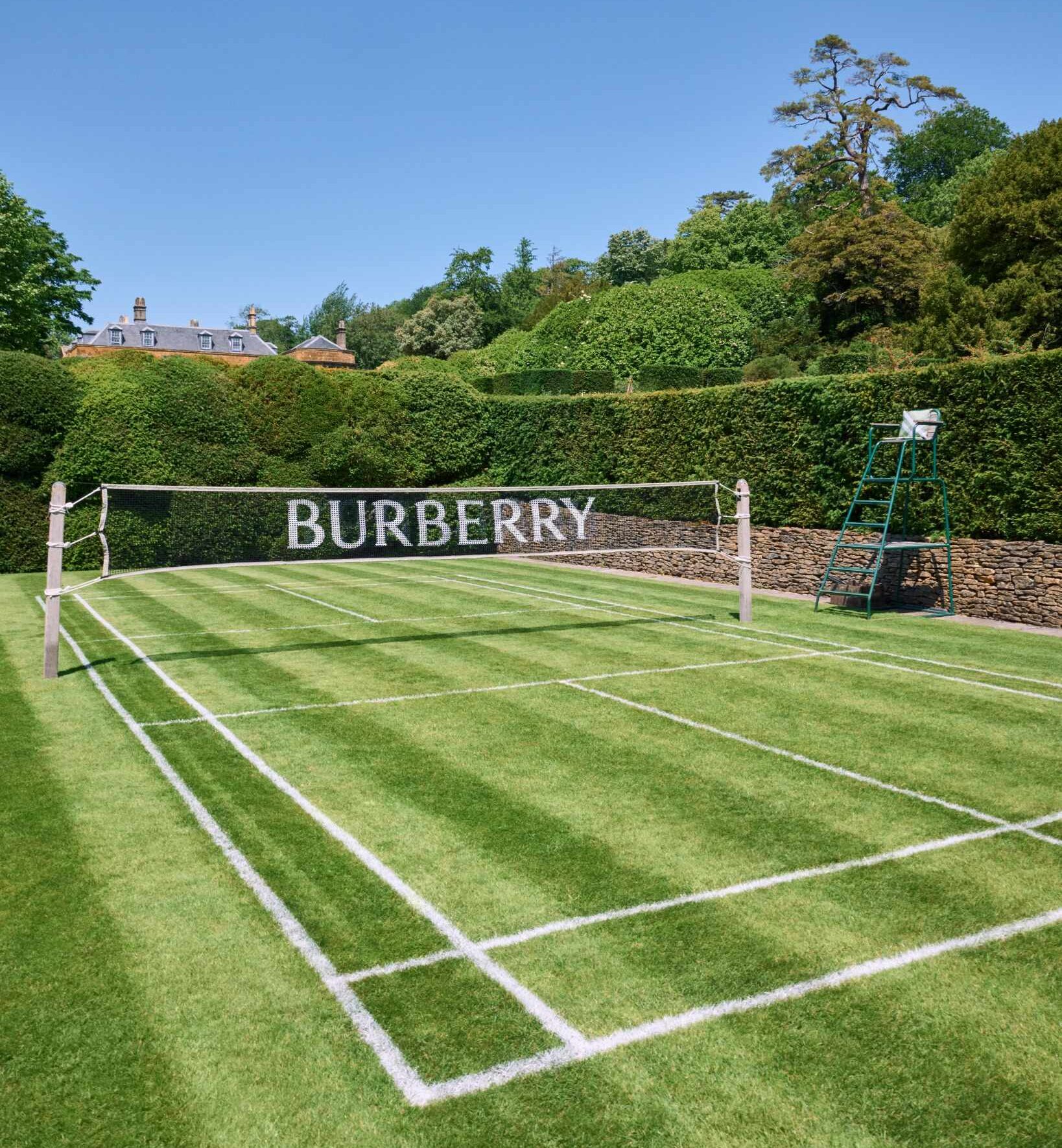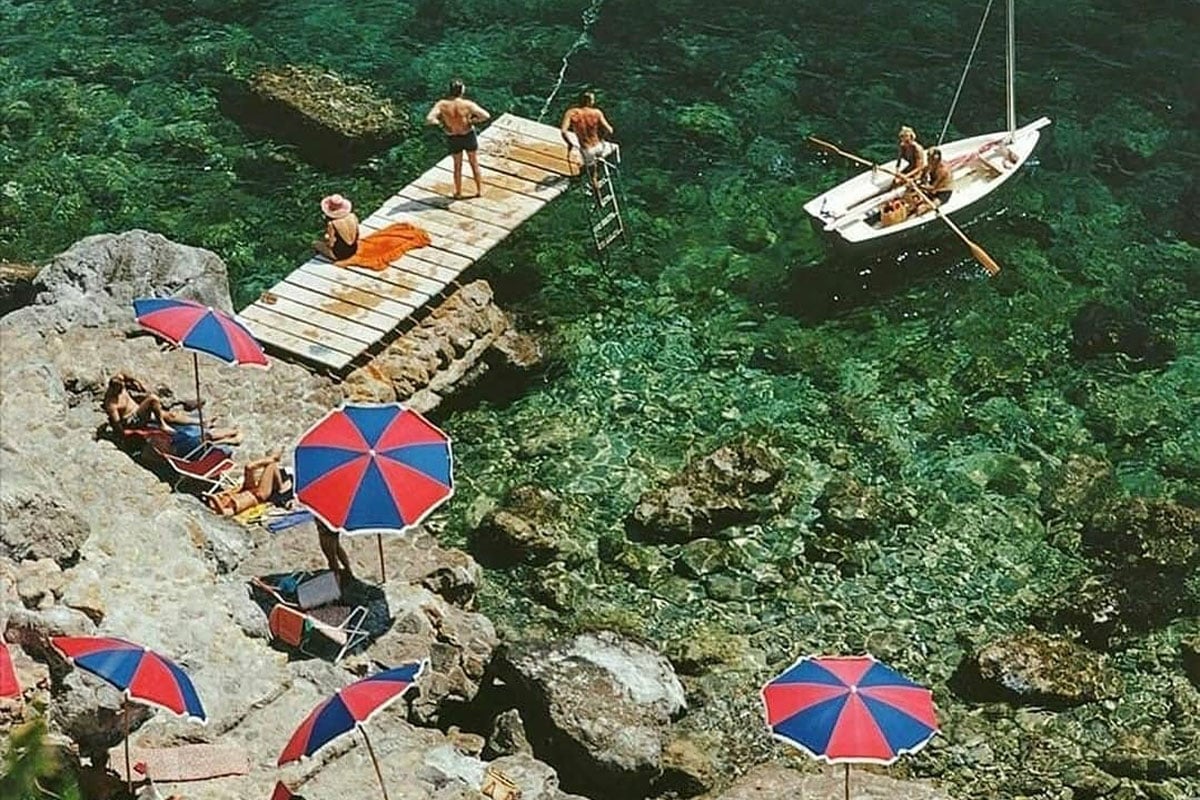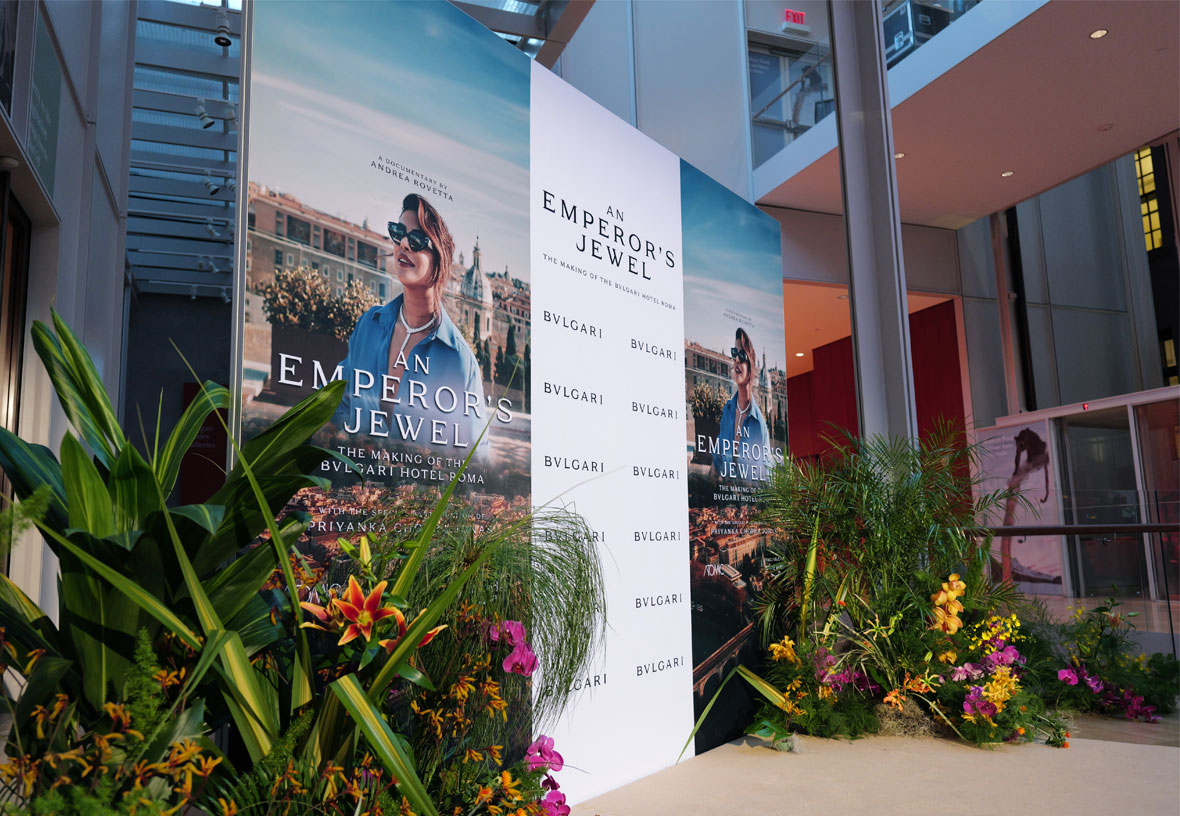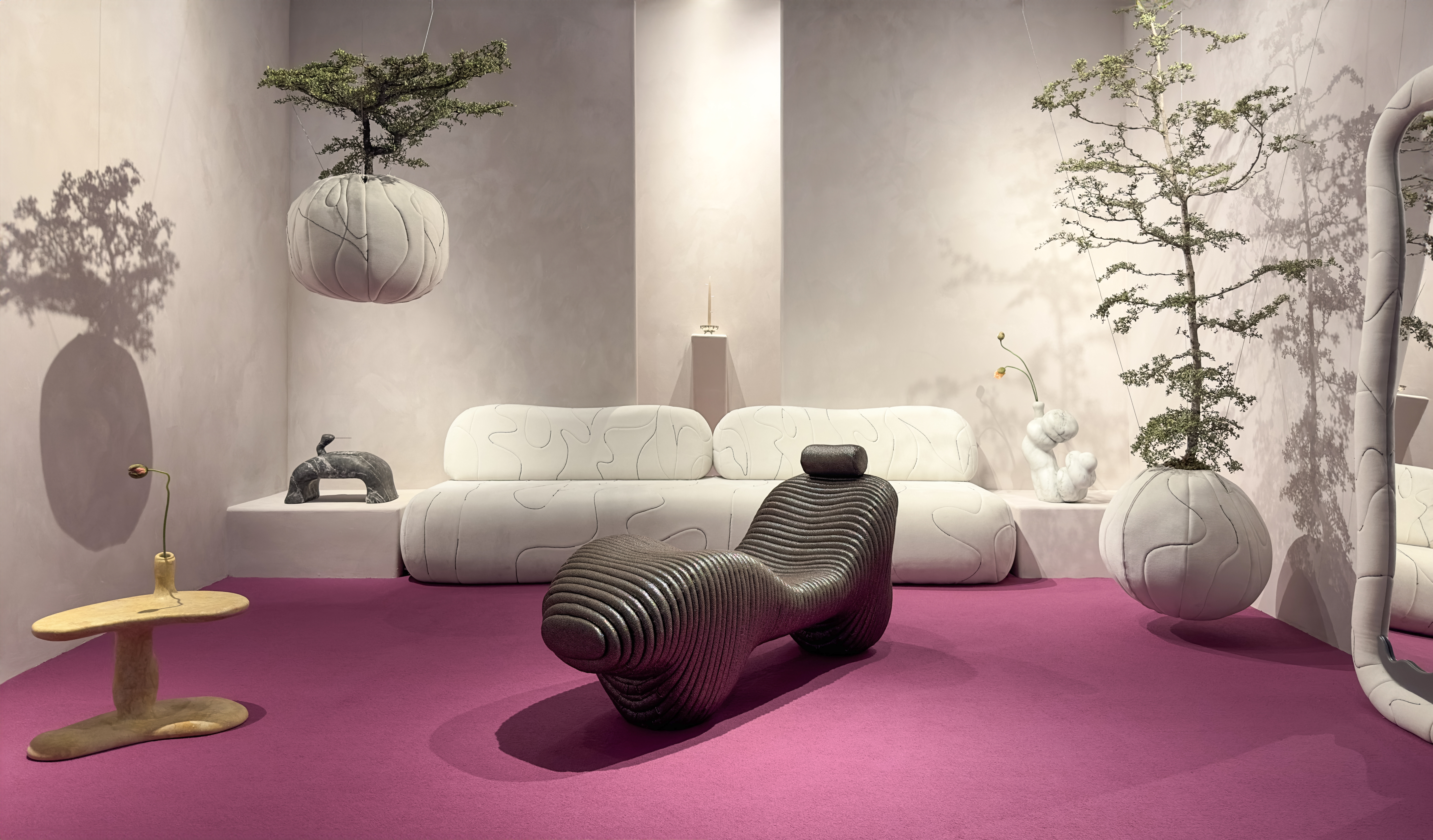We care about your privacy. We attempt to limit our use of cookies to those that help improve our site. By continuing to use this site, you agree to the use of cookies. To learn more about cookies see our Privacy Policy.
Palisociety’s Avi Brosh is Out to Create the Perfect Neighborhood Hotel
Create a hotel that feels local, but still maintains the integrity from a design perspective
“It’s not very often in a career where you can go from a platform of 5 hotels and go to a platform of 10 within a very short period of time,” Avi Brosh says, gleaming over the incredible period of growth his brand Palisociety is going through. A few years ago we spoke to Brosh about the brand, which designs and develops boutique hotels, and was initially limited to properties within Los Angeles. But since then everything has changed. “I think now is the right time to tell our story,” he insists, and he makes a good case. In November the brand opened its first hotel outside of L.A, in Seattle. They followed up right away with a Culver City opening in January, and are planning Westwood in May, and Miami (their first East Coast property) and San Francisco both in July. It’s an exciting time for Palisociety, and with so much having changed in hospitality in the last five years, we sat down with Brosh once again to get his insights on the industry and discuss his major year.
Seattle is the first Palisociety hotel to open outside of L.A, what was that experience like?
It was challenging but in a good way, and it was very rewarding. It really stayed true to the vision, which is to create a hotel that feels local, but still maintains the integrity of what we bring to the table from a design perspective, and it’s also a terrific value in the market. It’s right across the street from the Public Market, called Pike Place Market, and so I think obviously we have the benefits of a fantastic location. The other thing I would say about it is that Seattle as a market is really ready to dip its toe into things that are a little bit more design forward than they’ve experienced before. Something that’s more connected to the international design zeitgeist where historically in Seattle all the design has been hyper local, it’s really been heavily influenced by the Pacific Northwest.
I feel like that’s always needed in different places. It’s cool that you’re opening in San Francisco because I got to stay at the Proper, which was probably the only cool boutique hotel over there.
To me I think the Proper really did a great job, they definitely saw that in the market there was a need for something that was sophisticated, not just cheap and cheerful but something that people in L.A would respond to, and frankly people from everywhere else would respond well to. Their location is up and coming, so I think it’s going to take a while for them to ultimately get the traction they envision, but I think they’re long term thinkers, and I think the market and the location is going to come to them. We’re opening in Union Square, so I think that that is already an area that is sort of proven as a really solid location.
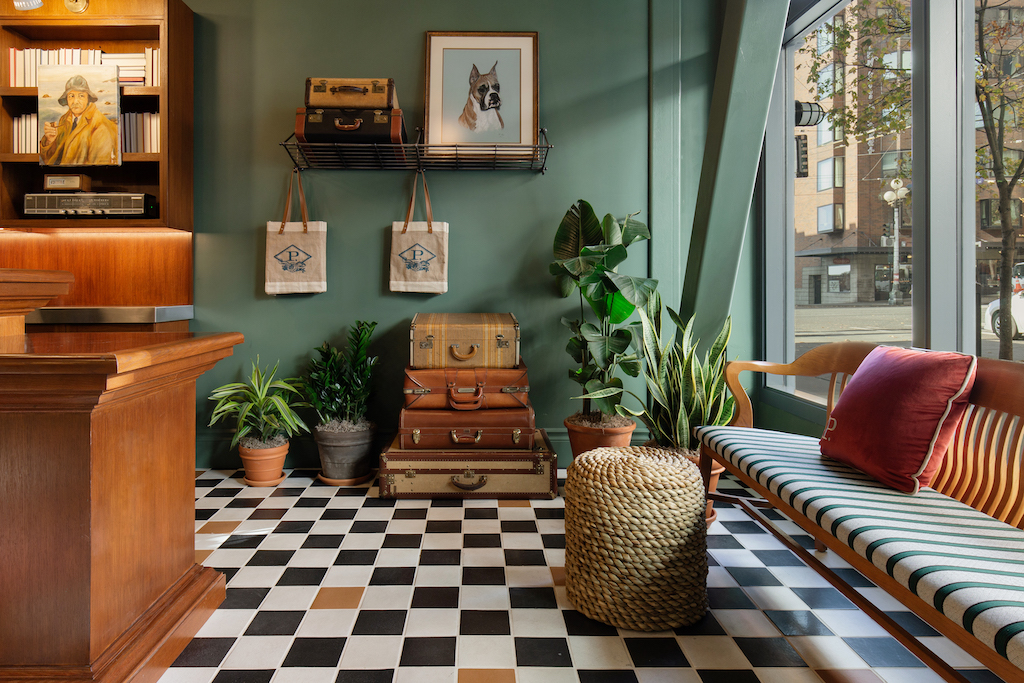
Palihotel Seattle
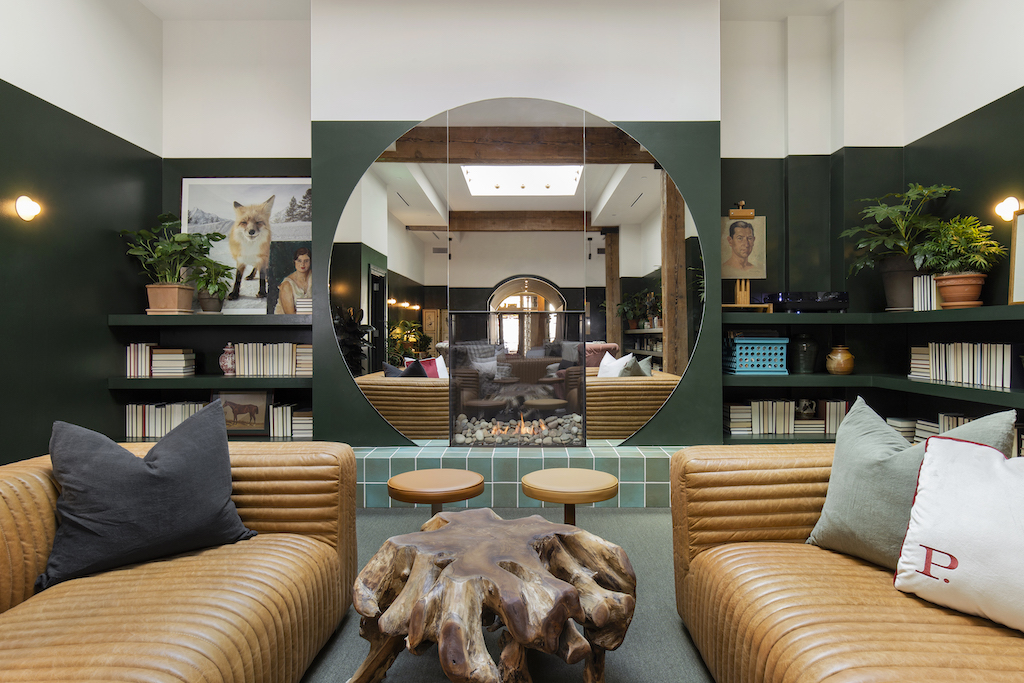
Palihotel Seattle
And more hotels are saying that: ‘what other markets can we tap into?’ That need exists everywhere.
I couldn’t agree with you more. I really believe that every customer base in every market is aware of what good design is. They know what good restaurants are, because access to seeing it, whether it’s on Instagram or Pinterest or Google, whatever it is, people know what high quality is, what the high bar for design is. I’m really interested in these hyperlocal markets that really need a neighborhood inn that the locals can really feel good about.
With the whole Amazon debacle in Long Island City, I thought about the increasing separation between city and country, and how companies like that need to bring jobs to other markets. It’s interesting how hotels are starting to do that, by creating temptation to visit those cities in the first place.
It seems like that’s the thing now. It used to be that the American hotel brands, the big box brands, were the ones that were leading the way. They were going to European markets that nobody else would go into. Whatever it was, Prague or Istanbul, wherever, where it was impossible for Westerners to go into, and they would be able to go in and stake their flag and they’ve been very successful doing that. Now, there are a lot of cities in America, in a lot of ways to be able to go into a market like that and say look we can do something that’s design forward, we can do something that is at the highest taste level. I think you’re going to see a lot more of that going forward.
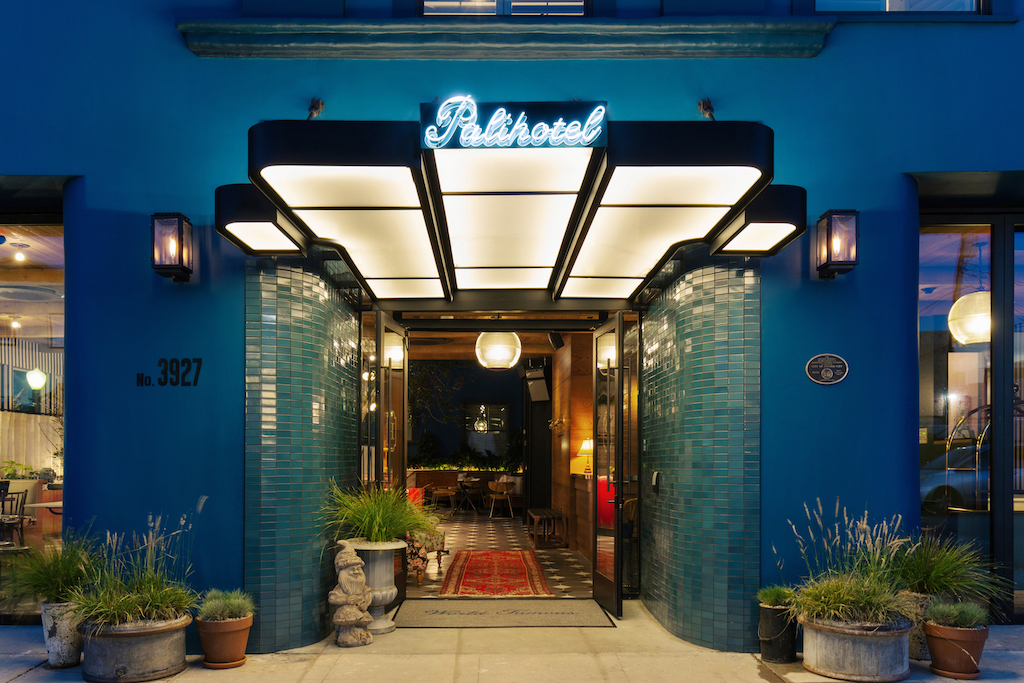
Palihotel Culver City
Going back to Palisociety, you have six hotels in L.A alone. How do you keep them distinguished from each other?
The answer to that question is Los Angeles today in 2019 has very specific defined neighborhoods, that have very specific defined things that happen to them. Not too dissimilar to Manhattan which is just an island, not a very big one, but the Upper East Side is completely different than the Upper West Side is completely different than the Lower East Side which is completely different form Soho which is completely different than Chelsea. And so Los Angeles is Venice is different from Brentwood is different from Westwood is different from Beverly Hills is different from West Hollywood, and so each of those areas, each of those neighborhoods needs their local neighborhood inn that champions that location. Yes we have six hotels in L.A, but each one has become the hub of that neighborhood. The hotels in Los Angeles, even though there are six of them, they range from 33 rooms to 55 rooms, and so they’re just not very big. We just opened in Culver City with 49 rooms, with a little 50 seat restaurant and bar, you don’t need to be a genius to know that that city, that location needs a little neighborhood hotel that the locals can use for their coffee shop, for their drink before dinner, to send their family members when they’re coming to town, and that’s how you do it. I think that’s how you open six hotels in Los Angels.
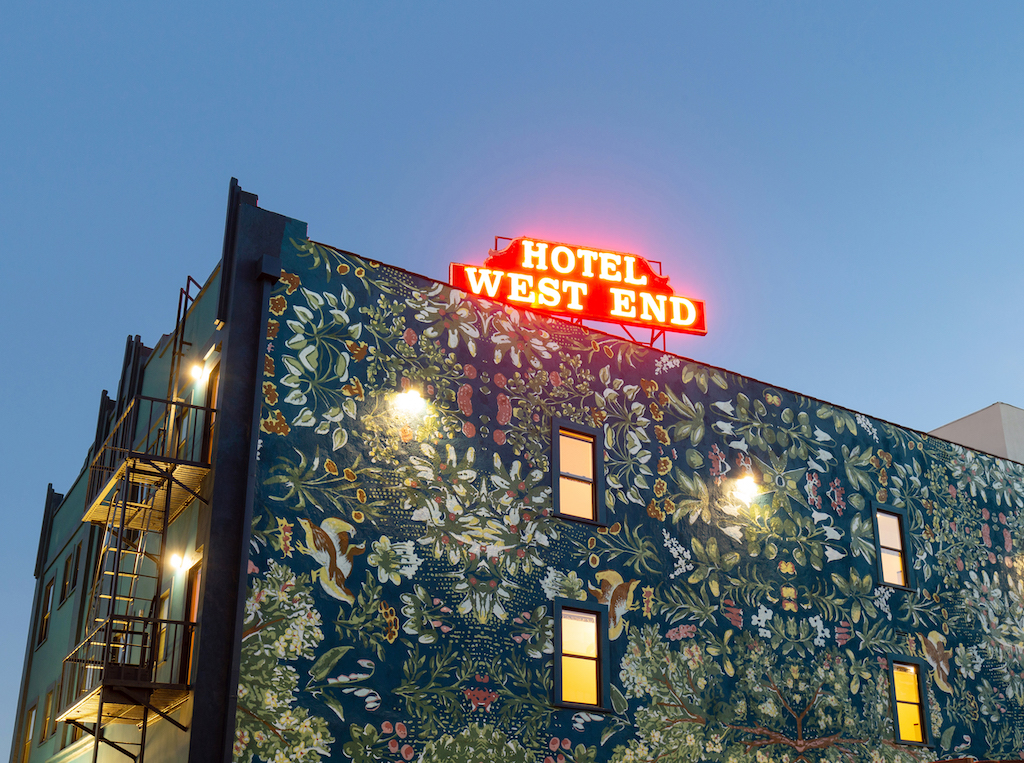
Palihotel Culver City
With the name ‘Palisociety’ what is it that you’re trying to cultivate?
We think about it very much as a society because all of the hotels are designed by us, they’re all operated by us, all the food and beverage is operated by us, and so the expression is consistent throughout. If you’re coming to West Hollywood, and your’e staying at a Palihouse, you’re going to get a suited product, you’re going to get something that has a kitchenette, a washer and dryer in unit, so you can live there, you can stay there for a week. But if you’re staying at Palihotel on Melrose, we wanted to make sure you knew that that room is not going to have a kitchenette, that room is not going to have a washer and dryer, that was going to be much more of a traditional set up, but what was going to be the same was that it was going to be brought to you by the same people. The design integrity was going to be the same, the service level was going to be the same, and you can count on us to give you the same experience you would have from one to the other. The quality of the experience is going to be uniform. And I think that was the idea behind Palisociey and then breaking it down between a suited hotel and a transient hotel.
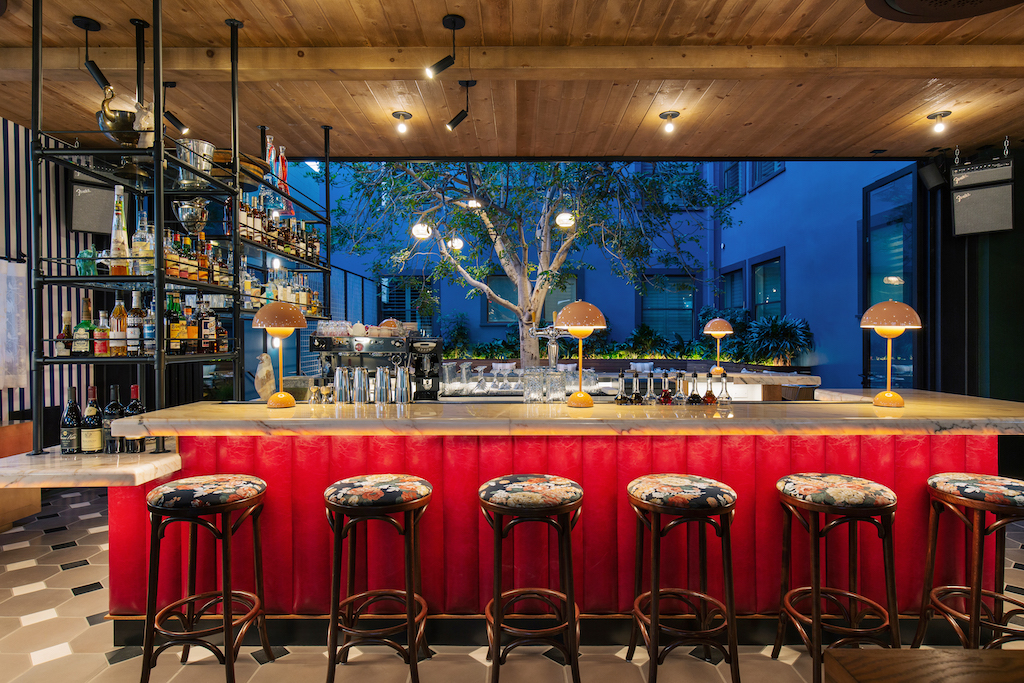
Palihotel Culver City
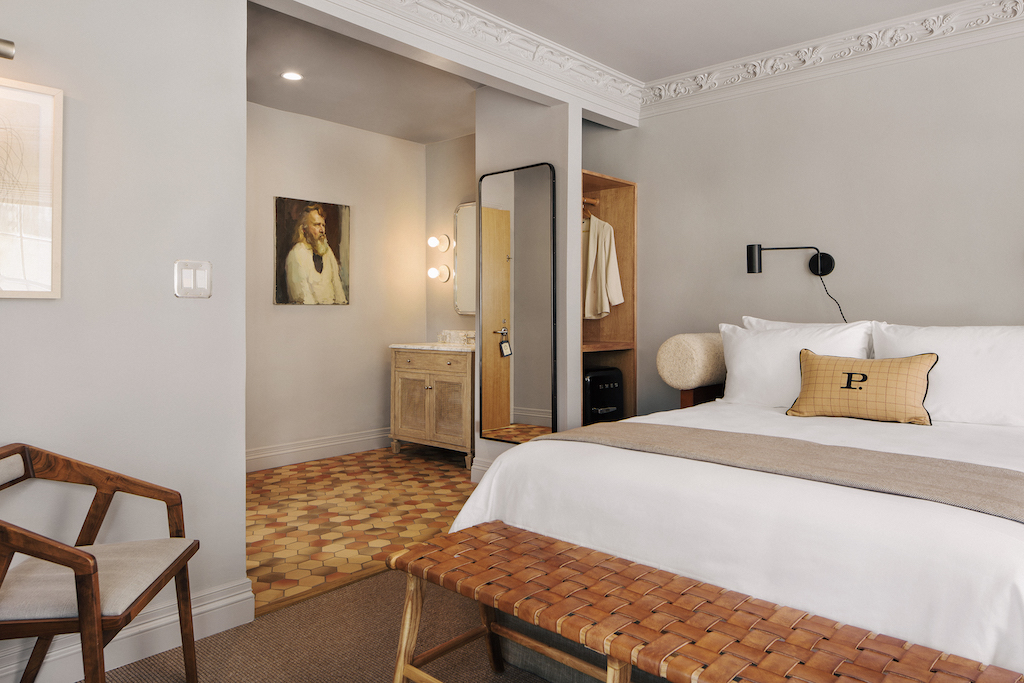
Palihotel Westwood Village
It seems that line between hotel and home is being blurred more, and people are gravitating towards that smaller, more intimate experience.
I think what I would say about that is people like options. And smaller and design forward is not for everybody, but what I happening is that people that historically stayed at let’s just say a W, because that was to them a better version of a Marriott, now have optionality. So what we’re doing is we’re just giving people more options, and I think there are a lot of people do gravitate to something that feels more human scale, perhaps it’s more tactile. And the other thing that I think we do well is we’re able to give you a Soho House aesthetic at a really great value, and I think there’s a market for that, so I think we’re democratizing a little bit the design experience. Because people are aware of the difference between good design and not; people are willing to make that choice over a more perhaps obvious choice which would be a branded flagged property.
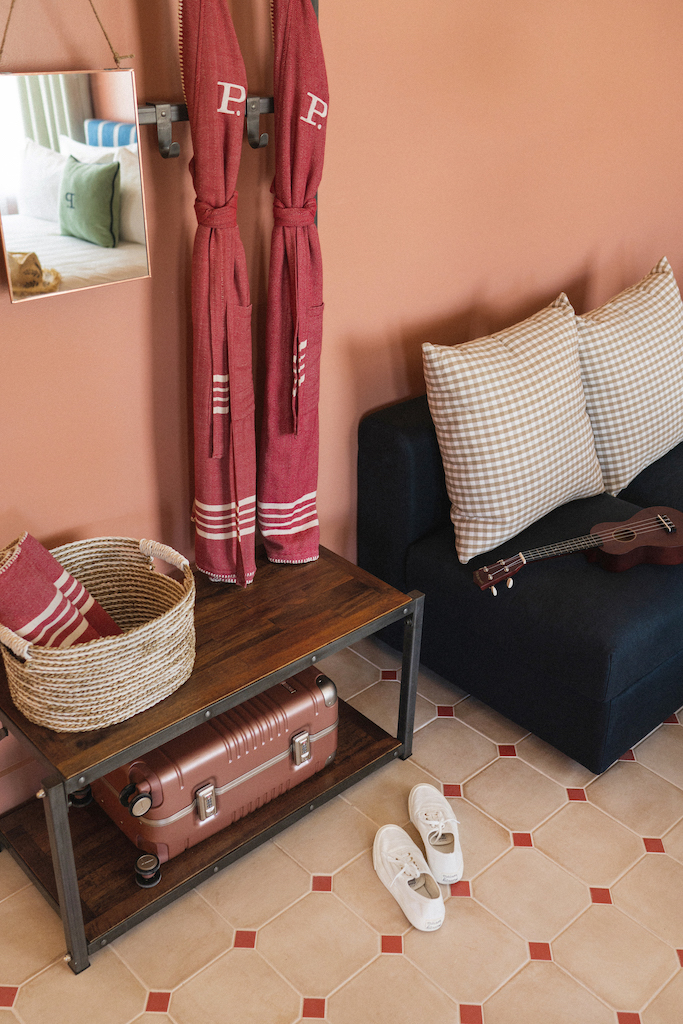
Palihouse Miami Beach
Speaking of design, Miami is a different city with its own history, how did that influence your design for that hotel?
The great thing about a market like Miami Beach is that really most of the product there is very uniform in its aesthetic. It’s very on the nose, everything is beach-y, everything is Florida, everything is yellow and white and pink, and I think that on some level people do and have historically expected that. But I think what happened, which was a really incredible development for Miami, was that Soho House opened there. And what that proved is that people were yearning for something more cosmopolitan, something that wasn’t so quite on the nose, something that was maybe more British than it was Floridian, and I think for me I took my cues from the customer that says just because I’m in Miami Beach doesn’t mean I don’t want something that’s chic. Is it going to feel like you’re somewhere coastal? For sure, I think you can’t pretend you’re not on the water, but to me I think what would somebody from Milan, if they had a pied-a-terre in Miami Beach, what would that be like? And so I’m bringing an added layer to the story, I’m not really pandering to let’s say old Art Deco Miami, I’m trying to put a little bit more of an international spin on it.
Do you think the clientele is changing at all, now that you’re on the East Coast?
Our number one customer for our California hotels comes from New York. Miami Beach—one of their top customer bases comes from New York. And so it was a no brainer for me to recognize that if we opened a Palihosue in Miami Beach that we had a built in audience, a captive audience already. And for us now it’s about layering on top of our New York customer, obviously our L.A customer, and our London customer which is a big part of our business, and now layering in a South America component to it. So I think that in a lot ways we have a leg up from brands that are not in Miami Beach yet because we already have a big following, so for me I feel really bullish about our prospects.
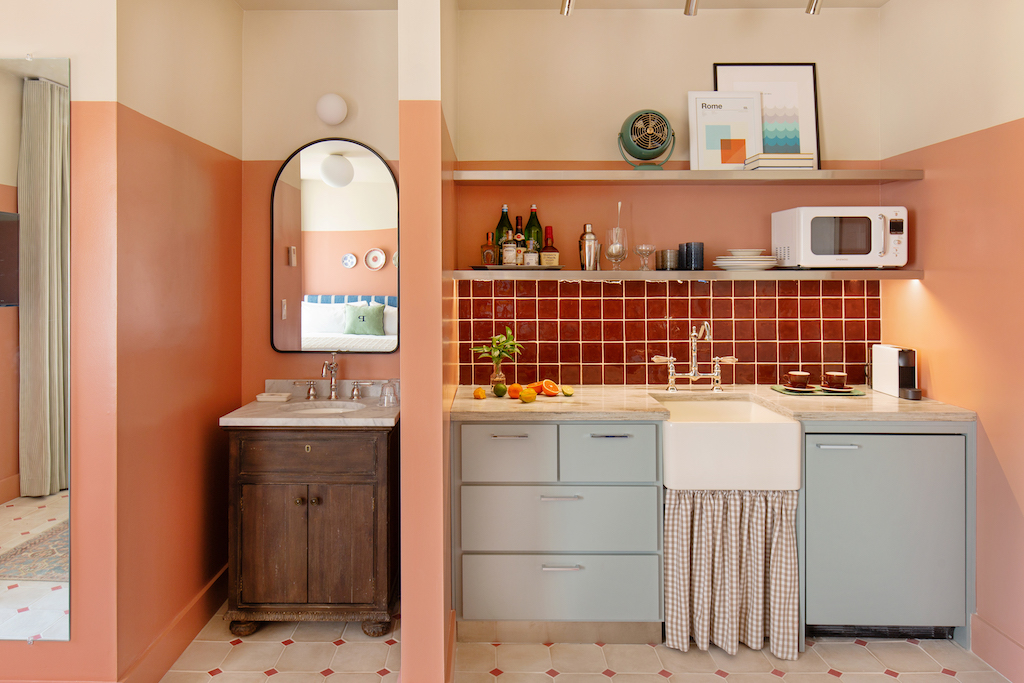
Palihouse Miami Beach
Last time you spoke to us about social media and its impact on hospitality. How do you feel its manifested in the way hotels are designed now?
I think it depends on the market you’re in. If you’re in a market with a lot of compression, I’m not sure having bloggers stay at your hotel moves the needle at all, I just don’t think it does anything for your business. And I think Instagram today is almost like your website; it’s your calling card, it’s your frame of reference, and I think people utilize it as a research tool.
Do I think that people keep social media in mind when designing a hotel? For sure. Do I? Not at all. I don’t think about it, it doesn’t even come into my consciousness one bit about what’s the Instagram moment. I’m focused on the core tactile human interaction that people have with lodging, that’s what I care about. I’m much more focused on what I’m trying to express in terms of a story. On some level I can’t worry too much about what everybody’s going to like, I have to do something that has integrity to me, and I think if I do that I’ll end up on the right side of things.
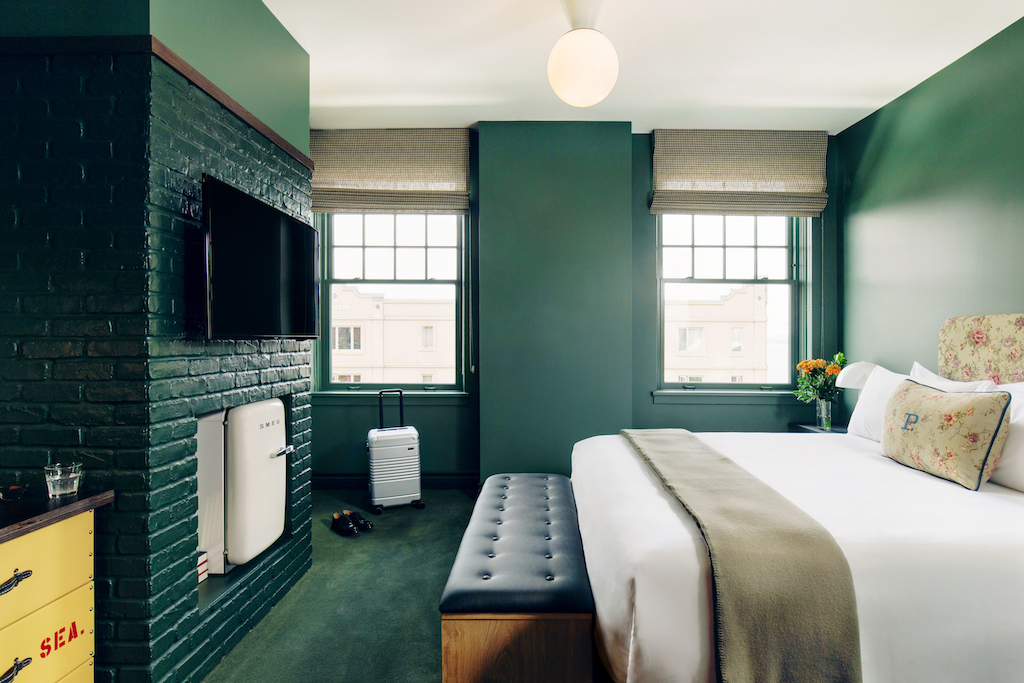
Palihotel Seattle
Besides, does the hotel world really need to change as quickly as other industries? Comfort is innate, it’s always going to be personal.
I really couldn’t agree with you more, I think that this for lodging to strive to disrupt and innovate at the same level that other industries do, I think is perhaps misguided on some level. What I always tell people I work with is when you turn the lights out in a hotel room it doesn’t matter if you’re in the Four Seasons or the Motel 6, your bed has got to be comfortable, your pillow has got to be comfortable, it’s got to be clean, the temperature has got to be right, and I think that if you sacrifice that on any level, it’s going to come back to bite you in the ass. To be hyper-focused on innovation, disruption, and technology, I’m personally going to leave that up to other people. I don’t need people walking up to my hotel and having facial recognition software, and so when people walk up to the desk they say ‘hi Mrs whatever, I see the last time you had the oatmeal…’
It’s a bit antithetical to the experience.
I think people in the short term are going to be freaked out by it. I’m freaked out by it!
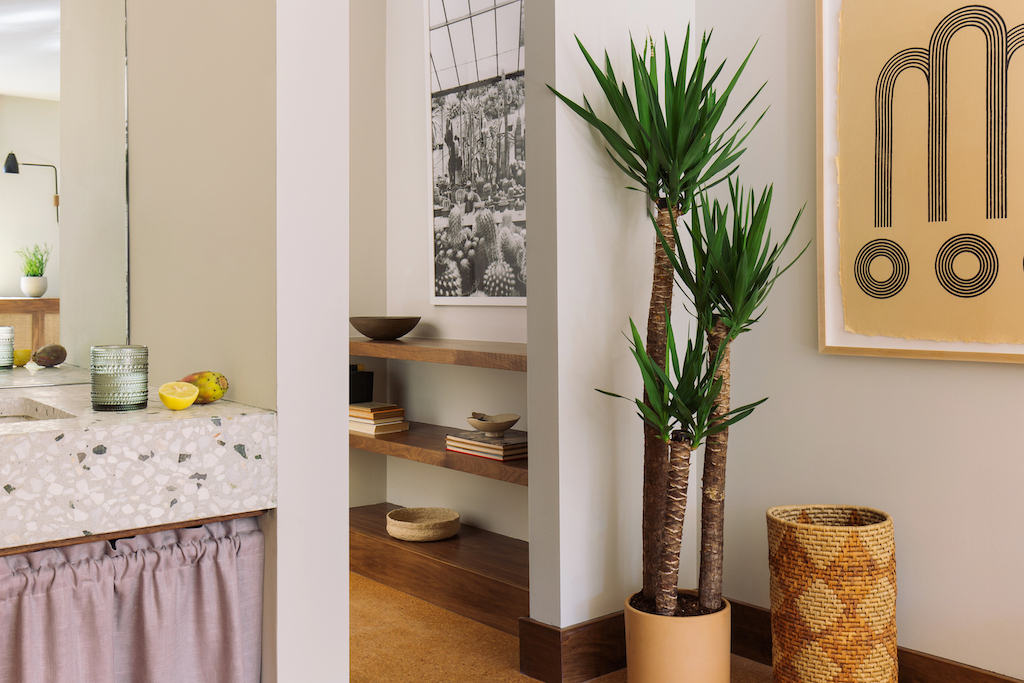
Silverlake Pool & Inn
How do you think your design philosophy is changing or evolving?
I think I’m getting better as I go, because I’m learning more and I’m having new experiences that inspire me, and because of that I think I just continuously making better places and telling better stories. I still get very jazzed about every new property that we do. Even projects that most people wouldn’t touch with a 10 foot pole, those are the ones that I’m inspired by the most, and so I feel like I haven’t come full circle in terms of the journey yet. I feel like I have a lot more to add and a lot more to do and I’m excited about having the opportunity to express myself in a lot of different vernaculars. I have very little interest in brand expansion in terms of outside of lodging, I’m into hotels and restaurants and maybe some collaboration here and there but the reality is I still feel like I haven’t really perfected it yet, there’s a lot more I really want to do in the space.
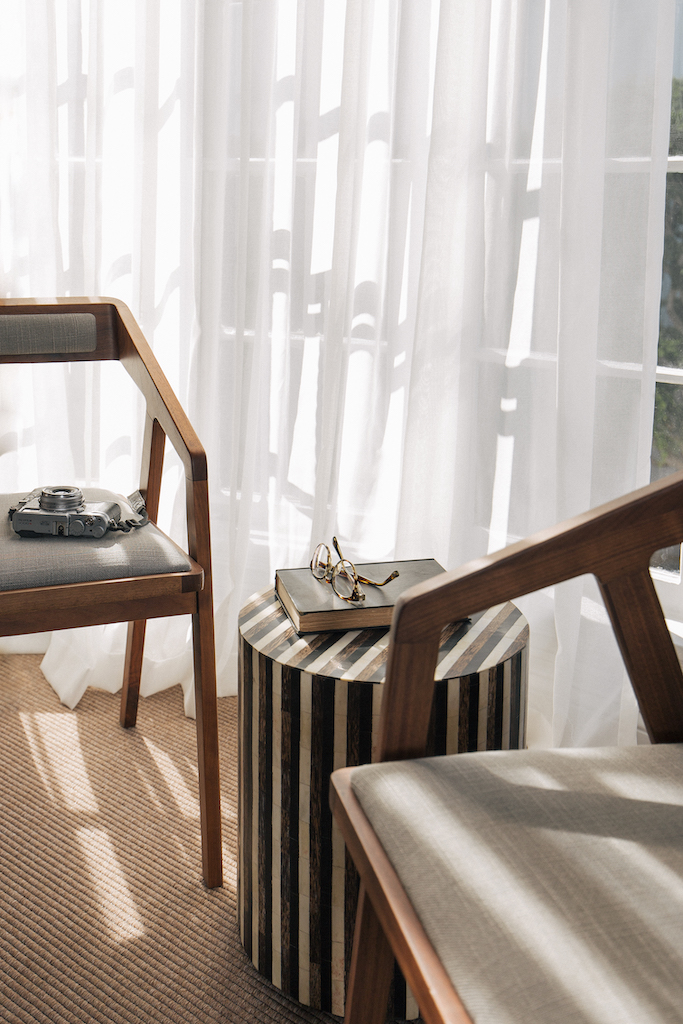
Palihotel Westwood Village
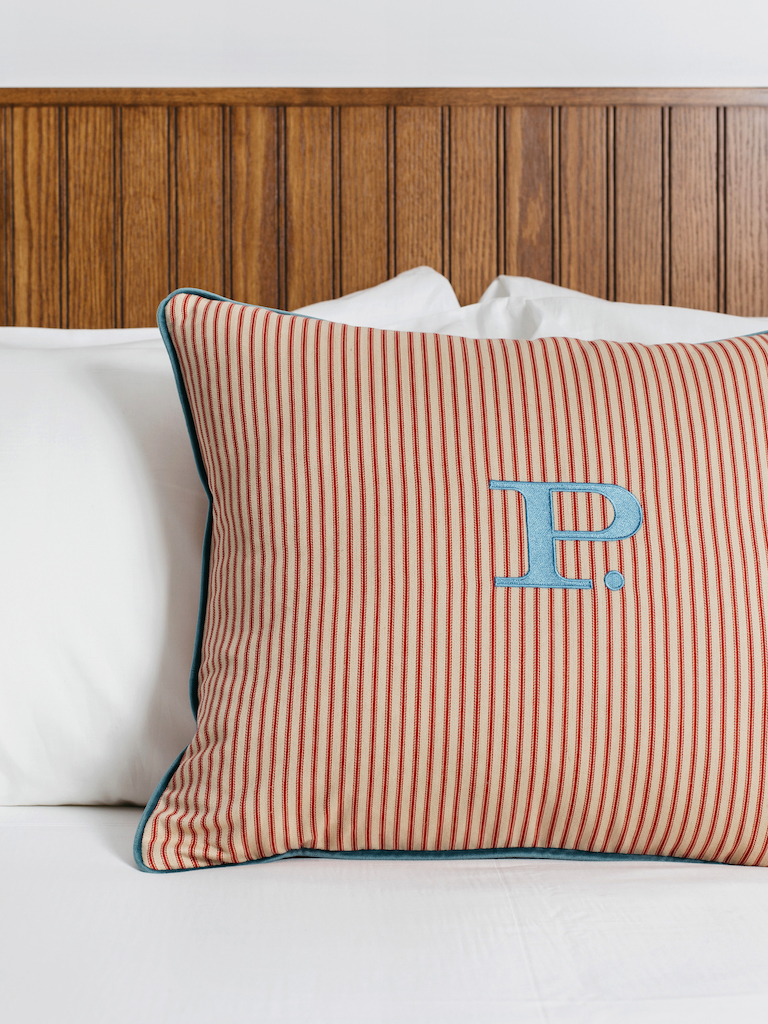
Palihotel Culver City
Share this Story
More Culture
Burberry Checks Into The Newt
The fashion-hospitality affair continues in the English countryside
tell me more ›Il Pellicano’s Enduring Allure
60 years of cliffside luxury, timeless style, and a spirit you can’t quite put into words
tell me more ›Bulgari Hotels Screens “An Emperor’s Jewel – The Making of The Bvlgari Hotel Roma” in NYC
Hoteliers, artists, designers, and media came together for a special screening of "An Emperor’s Jewel – The Making of The Bvlgari Hotel Roma” at the exquisite Morgan Library in New York City
tell me more ›“Becoming Familiar” Is The Experience To See and Touch at Design Miami 2023
LA Based Raise the Moral Studio Sensory Art Objects Win Best Curio Presentation at Design Miami 2023
tell me more ›
